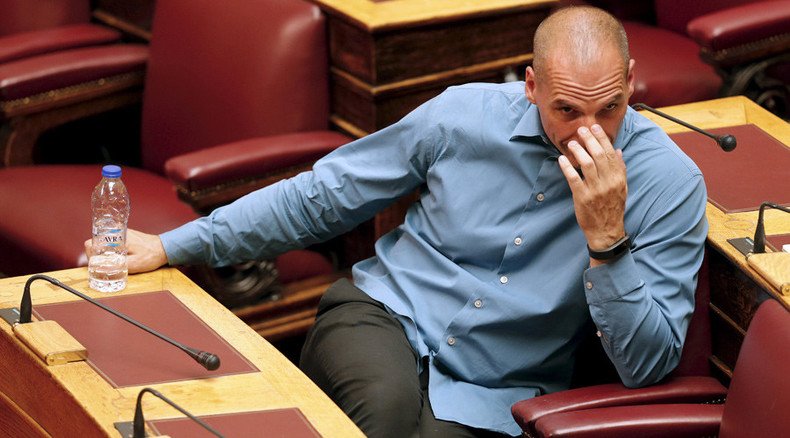Varoufakis was ready to start parallel banking system by hacking Greek tax department

The former Greek Finance Minister Yanis Varoufakis says he was authorized by Prime Minister Alexis Tsipras to create a parallel payment system should Greek banks be shut down. For this, he had to hack into taxation service files.
In a telephone call with international hedge funds supposedly run by former British Chancellor of the Exchequer Norman Lamont on July 16, Varoufakis said he had been given a green light in December by future PM Tsipras to prepare a plan for a parallel payment system, the Greek newspaper Kathimerini reports.
Varoufakis acknowledged then he might be recorded, but said if the talk became public, he would deny it.
His plan would have involved hacking into the taxation service database to gain access to tax registration numbers of people and companies. However, Tsipras backed out, Varoufakis said.
Varoufakis admits plans for parallel payment system, denies Grexit goal http://t.co/ZdSvOrtNIspic.twitter.com/AlcjdS515P
— Kathimerini English (@ekathimerini) July 27, 2015The idea was to create reserve accounts attached to tax file numbers. The government would have given PIN numbers to holders of taxation numbers, and created digital transfers into reserve accounts of the tax file numbers. So, if the banks were shutdown “as a result of the ECBs aggressive action to deny some breathing space,” Varoufakis’ plan would have been a parallel payment system.
“This was very well developed and I think it would have made a very big difference because very soon we could have extended it, using apps on smartphones and it could become a functioning parallel system and of course this would be euro denominated but at the drop of a hat it could be converted to a new drachma,” said Varoufakis.
He said that he was shocked to find out that the taxation department, the General Secretariat of Public Revenues, was under full control of the troika of international creditors, and his ministry couldn’t influence it.
"It’s like the Inland Revenue in the UK being controlled by Brussels. I am sure as you are hearing these words your hair is standing on end,” said the former minister.
Soon after Varoufakis became minister, it became clear that the software in the Ministry of Finance was also controlled by the troika. He turned to his friend, a professor of IT at Columbia University in the US.
“At some point, a week or so after we moved into the ministry, he calls me up and says to me: “You know what? I control the machines, I control the hardware but I do not control the software. The software belongs to the troika controlled General Secretary of Public Revenues. What do I do?” said Varoufakis.
In responding to media reports on Monday Varoufakis stressed that the quotes were accurate, but his intentions were twisted, as if he was for the drachma from the beginning, while he always was “completely against dismantling the euro.” All the plans he was working on during his term in the Cabinet were aimed at serving the interests of the Greek people.
“Ever since Mr. Varoufakis announced the existence of the Working Group, the media have indulged in far-fetched articles that damage the quality of public debate. The Ministry of Finance’s Working Group worked exclusively within the framework of government policy and its recommendations were always aimed at serving the public interest, at respecting the laws of the land, and at keeping the country in the eurozone,” said a statement on Varoufakis’ website.
Statement by Yanis Varoufakis on the FinMin’s Plan B Working Group & the parallel payment system http://t.co/9JTWNyq8JK
— Yanis Varoufakis (@yanisvaroufakis) July 27, 2015After 61 percent of Greeks voted against austerity in July, Varoufakis resigned, saying it would help Tsipras negotiate a better deal with foreign creditors. When the €86 billion rescue plan for Greece was reached by Tsipras and the lenders, Varoufakis said it was doomed to fail and voted against it in parliament.













